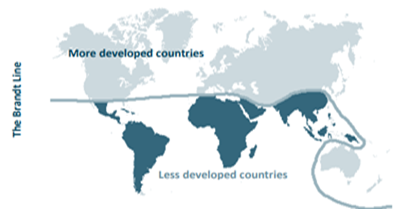

13th January 2023 (6 Topics)
Context
Addressing the inaugurating event at the virtual meeting of Voice of Global south summit, Prime minister has mentioned that the countries of the Global South will drive the world economy in the 21st century.
Highlights of the event:
- The goal of India in 2023 is to represent the Global South declaring “your voice is India’s voice. Your priorities are India’s priorities”.
- The event aims to stress the formula of “Respond, Recognise, Respect and Reform” for the Global South.
- The world should respond to the priorities of the Global South, recognise the principle of “common but differentiated responsibilities for global challenges, respect the sovereignty of all nations, rule of law and reform international institutions like the United Nations.
The North-South Divide:
- In the 1980s, the Brandt Line was developed as a way of showing how the world was geographically split into relatively richer and poorer nations. According to this model:
- Richer countries are almost all located in the Northern Hemisphere, except for Australia and New Zealand.
- Poorer countries are mostly located in tropical regions and the Southern Hemisphere.
- Global North refers loosely to countries like the US, Canada, Europe, Russia, Australia, and New Zealand. Global South includes countries in Asia, Africa, and South America.
- Some the South countries like China and China have emerged economically, in the last few decades.
- The progress achieved by many Asian countries is also seen as challenging the idea that the North is the ideal.

Factors that position India as the “Voice of the global south”:
- India harmonizes various interests that are ingrained deeply in India’s history and culture.
- Countries in Asia, Africa, and Latin America trust India to speak up for them.
- India has been at the forefront of expressing its concerns about fuel, food, and fertilizers.
- India acknowledges the fact, that sustainable development climate action and climate justice could be side-tracked due to more dominant issues.
- Global order today is not truly reflective of the state of the world. India has to take the lead in pushing for collective action.
- Institutions and practices created 75 years ago still dominate global decision-making.
- India supports the idea of introducing changes, not just in the United Nations but in other international institutions as well.
How can India be the Voice of the Global South?
- Championing the Global South today would demand more active Indian engagement with the messy regional politics within the developing world.
- India must also come to terms with the fact that the Global South is not a coherent group and does not have a single shared agenda. There is much differentiation within the South today in terms of wealth and power, needs and capabilities.
- This demands a tailored Indian policy for different regions and groups of the developing world.
- India is eager to become a bridge between the North and the South by focusing on practical outcomes rather than returning to old ideological battles. If India can translate this ambition into effective policy, there will be no contradiction between the simultaneous pursuit of universal and particular goals.


